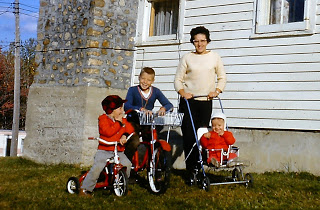You’ve been so very patient. I announced here, a long time ago, that I was writing a book and it was almost done. Obviously, I lied.
Given that this is a memoir, and given that I’ll only have one chance to tell this story, I’ve been rewriting and editing and tweaking. Finally, I am only a couple weeks away from being finished, at which time I will start looking for an agent or a publisher. That process will take months, but if I get no bites I will self-publish next year. I promise!
As a reward for your patience, please enjoy this excerpt from the chapter entitled “Smells Like Money.”
***
I was the youngest, born in October of 1963, five weeks to the day before the assassination of President Kennedy. For the remainder of my childhood years, Dad teased the men in town who weren’t lucky enough to have produced a son, let alone three, by offering his assistance, guaranteed boy, first try. When Mom heard him say this, she only rolled her eyes. On this subject, Dad was all talk.
Our little town was situated deep in the woods of Maine, the most densely forested state in the country. Tourists flocked to our picturesque coastline. Other than sportsmen, however, most visitors didn’t travel inland, and we preferred it that way.
People from away offended our sensibilities in countless ways, and we didn’t need their money. Our town did quite well, thank you, because we knew how to convert trees into paper, effectively spinning straw into gold.
Men like my maternal grandfather, Carl, cut and limbed trees at nearby forest operations. Pulp trucks loaded the timber and headed for the paper mill in the center of town. Every day this convoy paraded by our homes and businesses—a constant reminder of what drove the economy in our town, what put food on our tables, and where hundreds of our residents spent so much of their lives.
When the logs disappeared into the mill, men like my father and my paternal grandfather took over. They chipped, steamed, digested, washed, and bleached the fiber to a pulp. This pulp was then refined, colored, filtered, dried, cut, and wound into giant paper and tissue rolls, before being packaged and labeled. The finished products emerged from the other end of the mill where they were loaded into a separate fleet of trucks heading south. Always south. To the north there were nothing but more trees, potato fields, and the Canadian border.
Only the company’s top minds and most senior employees understood these complex processes. To everyone else, both workers and townspeople, it may as well have been magic. But the magic came at a price. The towering smokestacks emitted water vapor, soot, and airborne toxins in clouds of white, brown, or sometimes black. On clear days, this discharge blasted high and true, like a steam locomotive. On humid or drizzly days, however, it oozed out the top of the stacks, never rising far enough to be swept away by the prevailing winds. This viscous haze enveloped the town and permeated our homes.
Workers who picked up cigarettes and beer at Sampson’s grocery store or grabbed a bite at the Rose Bowl Restaurant wore the stench as a badge of honor rather than a source of shame. It meant each of them had a secure, high-paying job, presumably for life, unlike the store clerks and restaurant staff who waited on them.
At least a dozen towns in Maine smelled as bad or worse than we did. Rumford and Millinocket reeked, and Westbrook polluted Maine’s largest city, Portland. But no other mill town had a name with such an unfortunate rhyme. “Stinkin’ Lincoln!”
My father didn’t put up with the insult. When people from away disparaged his town and his employer, he growled, “Smells like money,” and that would be the last word on the matter.



Given your fan base (and that includes me), it looks like will get off to a great start with early sales!
I'm counting on it!
Wonderful! I am really looking forward to reading your book. My one request would be, "larger print, please!" But I'll buy the digital version so I can blow it up as large as I want.
You are correct. I must remember to use large print in these blog posts. Thanks for reminding me.